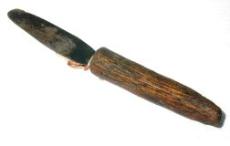Because they were uncircumcised, 18 male students were sent home from Kiriani High School in Meru, Kenya. The principal’s decision to send the students home started a controversy. After the students were sent home, the education ministry stepped in to allow them re-admittance, but it is unknown whether or not the students will be safe or comfortable enough to return to school after being violently intimidated by their peers in the school showers.
Since it is taboo to be uncircumcised in Kenya, there has been much speculation as to why the 18 students were not circumcised prior to beginning high school.
Traditional circumcision rituals are very expensive, so it’s possible that the students’ families could not afford the ritual in addition to school fees.
“A certain amount of bulls must be slaughtered and also you must pay a circumciser,” said Kenyan first-year student Kevin Muhanji.
It is also a possibility that the boys were uncircumcised because they did not want to risk losing their lives or the organ itself.
Muhanji explained some of the dangers associated with traditional circumcision in Kenya. Before the act is performed, boys and young men must walk outside together on a cold night with meat slung around their necks and chest, which can cause pneumonia.
In many traditions, several boys are circumcised on the same night, and the same knife is used on each boy, often without proper sterilization. This can transmit blood disease or AIDS. It is also common for a boy to bleed to death from the practice.
Muhanji said there have also been cases where, because of the circumciser using drugs or because of the surrounding chaos of the ceremonies, the circumciser has cut off the entire penis.
“Maybe the students, being educated, knew about the health consequences of traditional circumcision and did not want to die, but they did not have access to a hospital to have it performed there,” Muhanji said.
Kenyan parents are now frequently taking their sons to the hospital to be circumcised, realizing the injustice and danger of the traditional ritual, and this is becoming an increasingly acceptable option. Muhanji said it does not matter in most tribes whether boys are circumcised in the hospital or not, just as long as they are circumcised.
“It’s what makes you a man. It makes you macho according to our traditions,” said Muhanji.
So when the students of Kiriani High School discovered in the shower that a recently admitted student was uncircumcised, they intimidated him by chanting war and circumcision songs, calling him names, and demanding that he leave.
Apparently, the boy rushed to the principal’s office and was followed by 17 other uncircumcised students who had also been recently admitted. The 18 students spent the night in the boardroom in fear.
After this, the principal decided to send the boys home.
“Not observing the tradition of circumcision makes your peers feel like you’re not following tradition. It’s like betrayal,” said Muhanji. “But then on the other side, it’s not fair to chase the students from school just because they’re not circumcised.”
Some local elders have said that they agree with the principal’s decision.
One elder, George Njagi, said to the BBC, “Uncircumcised and circumcised boys are not allowed to bathe together, share towels, and on some occasions sit together to discuss issues.”
Another elder, Titus Munde, expressed that he agreed with the principal’s decision.
Munde said to the BBC, “The principal is very right, because it is very risky to mix the boys.”
However, the ministry of education has condemned the principal’s decision to make the uncircumcised students leave.
Regional education director Beatrice Adu said to the BBC, “Circumcision is not a requirement for one to be admitted to high school.”
Adu told the BBC that public institutions should not be run according to certain cultures and that the principal was to be reprimanded, but did not say what his reprimand would entail.
Despite the ministry of education’s involvement, if the students do not wish to become circumcised, it is possible that they will not return to high school because of the power that circumcision holds in Kenya as a cultural norm.
“If you are uncircumcised, you will be looked down upon forever. It’s so crucial,” said Muhanji. “Men simply have to do it.

